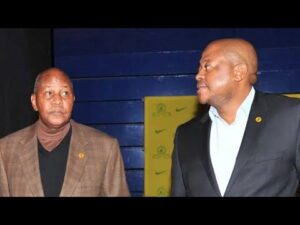The recent developments surrounding Kaizer Chiefs have brought about significant concerns and challenges, with Nasreddine Nabi confirming unsettling news for the club and its supporters. As a pivotal figure in the management and coaching structure, Nabi’s statements carry weight and reflect the current state of affairs within the organization.
Kaizer Chiefs, a prominent football club based in South Africa, has long been a powerhouse in African football, boasting a rich history and a passionate fan base. However, recent seasons have been tumultuous, marked by inconsistent performances and internal turmoil. Nabi’s confirmation of bad news suggests that these issues are far from resolved and may be escalating.

One of the primary concerns facing Kaizer Chiefs could be related to financial difficulties. Many football clubs worldwide have struggled with financial sustainability, exacerbated by the economic challenges brought on by the global pandemic. For Kaizer Chiefs, financial instability could translate into limitations on player acquisitions, wage payments, or even operational capabilities.
Another potential area of concern could revolve around the team’s performance on the field. Football is a results-driven sport, and fans and stakeholders alike expect consistent success from their teams. If Nasreddine Nabi’s confirmation of bad news pertains to ongoing challenges in coaching, player morale, or tactical strategies, it could spell further disappointment for Kaizer Chiefs supporters.
Moreover, the stability of the coaching staff and management structure is crucial for any football club’s success. If there are indications of instability or discord within these ranks, it could adversely affect the team’s performance and overall morale. Nabi’s role as a spokesperson for such matters underscores the gravity of the situation and the need for transparency in addressing these issues.
Beyond these immediate concerns, the long-term implications for Kaizer Chiefs as a football institution are also worth considering. A prolonged period of underperformance or instability could impact the club’s reputation, sponsorships, and fan loyalty, all of which are vital for sustained success in modern football.
However, amidst the challenges, there may also be opportunities for Kaizer Chiefs to reassess and rebuild. This could involve strategic planning, effective management of resources, and a renewed focus on youth development and talent scouting. Football is a cyclical sport, and clubs often experience periods of highs and lows. How Kaizer Chiefs navigate this current phase will be crucial in shaping their future trajectory.
In conclusion, Nasreddine Nabi’s confirmation of bad news for Kaizer Chiefs underscores the challenges facing the club at this juncture. Whether related to financial constraints, on-field performance, or internal stability, these issues require careful management and decisive action. The resilience of Kaizer Chiefs, both on and off the field, will be tested in the coming months as they strive to overcome adversity and regain their competitive edge in South African and continental football.


